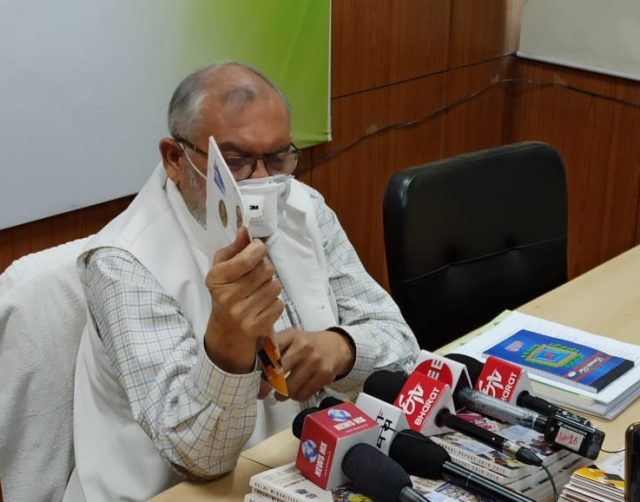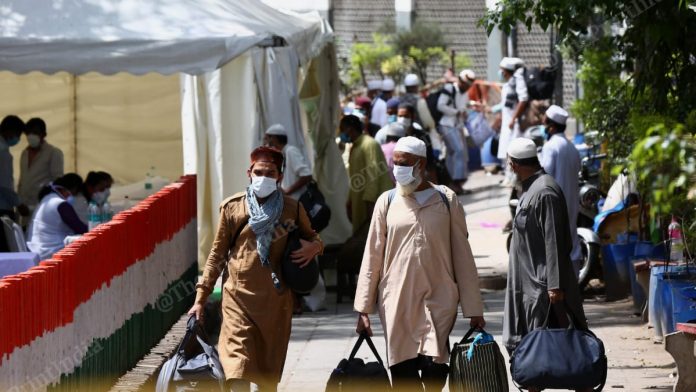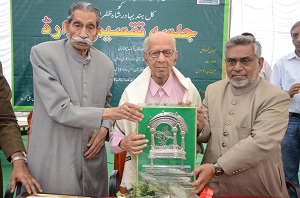NEW DELHI :
Delhi Minorities Commission initiated a scheme of awards to best performers in various fields of human endeavor in NCT of Delhi and beyond.
For 2019-2020, the Commission has decided to offer awards under 14 categories which are as follows:
(for X, XII classes students securing 96+ per cent marks), Communal Harmony, Community Service, Human Rights, Non-Government Organisations, Promotors of Punjabi, Promotors of Urdu, Sports, Supporters of Minorities, Teachers of Substance, Print & Electronic Media persons, Outstanding Schools, Special Awards, Life-Long Achievement. This year 178 awards have been given under these categories.
Two new categories, Special Awards and Lifetime Achievement Awards, have been added to the list this year.

These awards are given mainly to residents of NCT Delhi but in exceptional cases, awards are also been given to persons from outside Delhi. Each awardee will be honoured with a shield.
A booklet containing photo of each awardee with a short introduction about his/her achievements has also been printed and is available at https://archive.org/details/dmc-2019-awards . (Please see below for a short list of the awardees).
The following is the full list of the awardees under various categories:
ACADEMIC EXCELLENCE (students who secured over 95% in High School and Higher Secondary exams in 2019):
Flavia Ekka (St. George’s School, Alaknanda, High School Exams 97.6%), Tracey James (Fr. Angel Sr. Sec School, Senior Secondary Exams 97.4%), Himieka Jain (DPS Mathura Road, High School Exams 97.2%), Garima Jain (DPS Mathura Road, Senior Secondary Exam Exams 97.4%), Kulsum Azad (Hamdard Public School, High School Exams 96.6%), Abeer Mohammad Asad (DPS Mathura Road, Senior Secondary Exams 97%), Mahwash Rizvi (Greenfield School, Senior Secondary Exams 96.8%), Mohd. Sadique Raza (Father Agnel School, NOIDA, High School Exams 98.4%), Afrah Naayaab (DPS Indirapuram, High School 97%), Harjas Kaur (Guru Nanak Public School, Pushpanjali Enclave, High School Exams 96%), Harjyot Singh Sidhu (DPS Mathura Road, Senior Secondary 95.4%), Aliza Alvi (DPS Indirapuram, High School 97%), Ancy A Daniel (ST. George’s School,High School Exams 97%), Anjali Maria Antony (Mater DEI School, Senior Secondary Exams 98.4%), Divya Jain (St Joseph’s Academy, High School Exams 95.4%), Aayush Jain (DPS Mathura Road, Senior Secondary Exams 97.2%), Zainab S. Qazi (Hamdard Public School, High School Exams 96.2%), Ruba Haider (DPS Mathura Road, Senior Secondary Exams 96.8%), Ms Sana (SGGSS Sc 2, Jama Masjid, Senior Secondary Exams 97.6%), Ms. Mantasha Ilma (Jamia Girls Sr. Sec. School, High School Exams 97.6%, Dashmeet Kaur (St Joseph’s Academy, High School Exams98%), Japneet Singh (Springdale’s School Pusa Road, Senior Secondary Exams 97.8%), Harjeet Singh Bedi (DPS Mathura Road, Senior Secondary Exams95.4%), Mahi Singh (Springdale, Sr Sec Exam 96/75%), Namira Rasheed Khan (DPS Ghaziabad, High School 96.6%), Barundeep Singh Gambhir (DPS Mathura Rd, Sr. Sec. Exams 96%).
COMMUNAL HARMONY:
Fr. Dr. M.D. Thomas(interfaith dialogue), Rev. Dr Vincent Manoharan (interfaith dialogue), Tej Lal Bharti(communal harmony), M. Farooq Engineer (communal harmony), Raees Ahmad (journalist and human rights worker), Iqbal Mulla (interfaith dialogue), Baba Hardip Singh-ji (communal harmony), Soul of Humanity (NGO helping needy people), Vishav Satsang Sabha (NGO working for communal harmony), Syed Abdullah Tariq(interfaith dialogue and communal harmony), Jayshree Shukla (promoter of the composite culture, author of photo essays on Old Delhi).
COMMUNITY SERVICE:
Bhadant Buddha Kirti (serving the Buddhist community), Asad Masih (Muneer Social Welfare Society), Reena Charles ((Human rights, community service), Victor (social worker), Fr. Varghese Kunnath (seminar, orientation and training for youth, students, teachers), Rehab Foundation(community service), Karwan Foundation (community service), Sahulat Microfinance Society (national NGO promoting and facilitating interest-free microfinance), Ashwani Kumar Bairwa (president of NGO, social work in Badarpur area), Mohd. Khalid Khan (community service), Dr. Badrul Islam (promoter of Yoga), Sarabjeet Singh (community service), Adv. Abu Bakr Sabbaq(Community Service, human rights defender), Musharraf Husain (community service), Shama Khan (community service, especially in slum areas), Masroor Ul Hasan Siddiqui (community service), Mrs Feroza Jassawalla (community service), S. Gurvinder Singh (helping minority communities through promotion of education of children), Manjeet Singh (Nanak GA Charitable Foundation), Parmeet Singh Chadha (social worker), Mandeep Singh (serving minorities by supporting educational institutions and NGOs), Virasat Sikhism Trust (doing sewa to uplift Sikh Heritage and Punjabi language), Perminder Singh Malik (community service, especially by promoting education), Hasleen Singh Sodhi Adv. (helping minority community legally), Bibi Tarvinder Kaur Khalsa(community service), Avtar Singh (community service), Gagandeep Singh (community service), Inderjit Singh Asth (community service), Jaspal Singh (community service), Swaran Jeet Singh (community service), Ajeet Kaur (community service), Dr. Anju Jain (community service), Manjeet Singh(community service), Tanveer Kazi (community service as the Delhi head of Action Aid India), Ovais Sultan Khan (human rights activist), D. S. Bindra Adv. (regular organiser of langars), Victor (social worker), Adv. H R Khan (human rights and education activist), Manjeet Singh Chugh (RTI activist, PIL).
HUMAN RIGHTS:
Dr. Denzil Fernandes SJ (social scientist working for the human rights), AC Michael(minority rights activist, former Member, DMC), Mrs. Anna Pinto (human rights activist), Farah Naqvi (writer & human rights activist), Armeet Singh Khanpuri (escorted back home 32 Kashmiri girls; saved 15 girls in riots), Mahmood Pracha Adv. (human rights defender), Quill Foundation (human rights of marginalized communities).
NON-GOVERNMENT ORGANISATIONS:
Institute of Objective Studies (research institute and think tank), Haq Educational & Social Welfare Society (vocational training centre), Sikh Youth Organization, Mahakanishk Bodh Vihar Kalyan Samiti, Guru Daami Foundation, Pratyek (networking with 2000 schools in the country), Budhiye Dhamn Charika Samiti Delhi Pardesh, YWCA of Delhi, Action Aid India
PROMOTORS OF PUNJABI:
Punjabi Helpline, AnveetKaur Bhatia
PROMOTORS OF URDU:
Irfan Rahi(poet), Prof. Khalid Mahmood (writer, critic), Musharraf Alam Zauqi (writer, novelist, journalist), Syed Sahil Agha (Dastangoi).
SPORTS:
Mohd. Arif (Para athletics), Mariya Tehreem Khan (Football), Nazma (Judo), Mohd. Sadaqeen (Fencing), Ayesha (Rope skipping), Anushka Samuel (Football), Ronak Jain (Cricket), Adil Nargolwala (marathon runner), Harnaik Singh Sahni (Hockey), Zaorawar Singh (Jump rope), Manjeet Singh (Hockey), Dhavneet Singh Bakshi (Cricket), Tanveer Singh Jubbal (Marathon runner), Vineet Kaur (Air Pistol Shooting), Rahul Sagar (Karate, Taekwondo), Tushar (Karate), Ranveer Singh Saini(Golf)
SUPPORTERS OF MINORITIES:
Bhairav Singh (Ambedkar Samaj Vikas Sangthan), Dr. S. S. MINHAS (holistic development of young students), Gurminder Singh Matharu (Member, SGPC Amritsar), Jagtar Singh (helped repatriation of 32 stranded Kashmiri girls safely to their homes in the Valley), Gurpreet Singh Bindra (helped repatriation of 32 stranded Kashmiri girls safely to their homes in the Valley), Baljeet Singh (helped repatriation of 32 stranded Kashmiri girls safely to their homes in the Valley), Harminder Singh (helped repatriation of 32 stranded Kashmiri girls safely to their homes in the Valley), Jajinder Singh (helped repatriation of 32 stranded Kashmiri girls safely to their homes in the Valley), Msgr Susai Sebastian (former director, Chetanalaya),Victor Henry Sequeira (social worker), Bishop Warris Masih (peace-making in churches society), Franklin Ceasar Thomas (fighter for the rights of Christian and Muslim Dalits), Dr. Fr. P.R. John SJ (Principal, Vidya Jyoti College), Ajit Singh Sehra (Ujjwal Bhavishya NGO), Saleem Baig (worker for community uplift, RTI activist).
TEACHERS OF SUBSTANCE:
Saiby Mathew (Don Bosco School), Mrs. Magdalene Bhat (St. Michael’s Sr. Sec. School), Mrs. Maria Rodrigues (St. Xavier’s School), Ms. Grace David (St. Columba’s School), Mrs. Anne Albin (Mater Die School), Mrs. Tarannum Shoukat Ali (Rabea Girls Public School), Nazia Nikhat (Zakir Nagar 1 Urdu School), Rana Tasleem (Zakir Nagar 2 Urdu School), Mrs Jeanie Naozer Aibara (Principal of Ambience Public School), Pritam Singh (Guru Harkrishan Publicc School, Shahdra), dr. Prabhjot Kaur (educational consultant and motivator), Swarn Singh (Guru Harkrishan Public School, Vasant Vihar), Mr. S. L. Jain (Director, Mahavir Senior Model School), Dr. Haleema Sadia (26 years of experience as teacher, currently Dy. Director (Education), Delhi Waqf Board).
PRINT & ELECTRONIC MEDIA PERSONS:
Gurpreet Singh Sethi (photographer and maker of short films), S. Amrik Singh Kooner (Akaal Channel), S. Gurpreet Singh Bhooi (Akal Channel), Md. Mahtab Alam (The Wire Urdu), Qurban Ali (veteran TV, radio, print and Net journalist), Abhisar Sharma (outspoken and brave TV journalist), Lucy Gabriel Chattopadhyay (All India Radio External Services), Mobin Ahmed Khan (All India Radio), Humra Quraishi (prolific writer, columnist, journalist, book-reviewer and author), Masoom Moradabadi (celebrated Urdu journalist), Suhail Anjum (celebrated Urdu journalist), Muhmamad Anjum (Inquilab), Shaheen Abdulla (committed young journalist), Aditya Menon (journalist committed to the causes of the masses).
OUTSTANDING SCHOOLS:
Hamdard Public School, Talimabad, New Horizon School, Scholar School, Abul Fazal Enclave, St. Xavier’s School, Shahbad Daulatpur, Mater Dei School, Tilak Lane, Don Bosco School, Alaknanda, Dr Zakir Husain Memorial Sr. Sec. School Jafarabad, Rajkiya Pratibha Vikas Vidyalaya, Dwarka (first ranking in government-run day schools in the country).
SPECIAL AWARDS:
Mohd. Rizwan (young inventor), N.M. Theerthe Gowda (arbitrator and advocate), Ms. Khursheed R. Nariman (sculptor), Bhupinder Pal Singh Walia (historian of gurudwaras in Africa), Gobind Sadan, Gadaipur, Mehrauli (Sikh-led interfaith community celebrating all religions).
LIFE-LONG ACHIEVEMENT:
Dr. Manzoor Alam (Chairman, Institute of Objective Studies), S. Rajinder Singh-Ji (Head Granthi, Gurudwara Rakab Ganj), Mary Pat Fisher (author, promoter of interfaith dialogue), Fr. Cedric Prakash SJ (human rights, peace, interfaith and reconciliation activist), Nirmal Kumar Jain Sethi (welfare and promotion of the Jain community), Prof. Haseena Hashia (academia and welfare of the Muslim community), Teesta Setalvad (human rights and rule of law), Prof. Akhtarul Wasey (Islamic scholar with life-long commitment to academia, interfaith dialogue and welfare and promotion of the Muslim community), Mufti Ataur Rahman Qasmi (Islamic scholar, chronicler of Delhi, Haryana and Punjab mosques).
(Full list of DMC Awards 2019 with photographs and more information about each awardee is available here:https://archive.org/details/dmc-2019-awards)
source: http://www.theindianawaaz.com / The Indian Awaaz / Home> Amm/New Delhi / by Indian Awaaz / June 09th, 2020










